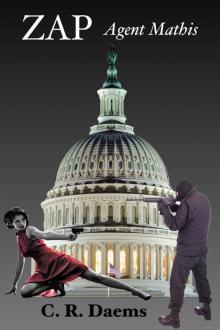- Home
- C. R. Daems
The Riss Proposal: Book II in the Riss Series (Volume 2)
The Riss Proposal: Book II in the Riss Series (Volume 2) Read online
THE RISS PROPOSAL:Book 2 in THE RISS SERIES
by
C. R. DAEMS
WHISKEY CREEK PRESS
www.whiskeycreekpress.com
Published by
WHISKEY CREEK PRESS
Whiskey Creek Press
PO Box 51052 Casper, WY 82605-1052
www.whiskeycreekpress.com
copyright 2012 by C. R. Daems
Names, characters and incidents depicted in this book are products of the author’s imagination or are used fictitiously. Any resemblance to actual events, locales, organizations, or persons, living or dead, is entirely coincidental and beyond the intent of the author or the publisher.
No part of this book may be reproduced or transmitted in any form or by any means, electronic or mechanical, including photocopying, recording, or by any information storage and retrieval system, without permission in writing from the publisher.
ISBN: 978-1-61160-364-4
Credits
Cover Artist: Gemini Judson
Editor: Dave Field
Printed in the United States of America
Other Books by Author Available at Whiskey Creek Press:
www.whiskeycreekpress.com
The Riss Gamble: Book I in the Riss Series
Nadya dreams of space travel, meeting aliens. She’s accepted into a project providing education, a commission in the SAS Fleet, and partnership with an alien. But everything comes with a price—the alien’s a parasite that inhabits the body and mind. Is it a dream or a nightmare?
Chapter 1
I stood looking up at the white and black streaked granite steps leading to the Sadr Alliance of Stars (SAS) Air Defense building. Stretching fifty-people wide and at least twenty-five deep, they were just as intimidating as the first time I had been directed to report to Admiral Plimson.
I could feel Thalia’s amusement. Not too surprising since my Riss companion, an intelligent parasite, found everything amusing.
A pointless deception since Thalia was an integral part of my neurological system and would know I was lying.
My meeting had been scheduled in the late afternoon and traffic in the massive circular lobby was light. I walked around the information counter sitting in the center of the room and made my way towards the station for visiting military personnel. As I approached, the two security guards tensed ever so slightly. I shrugged mentally. It was the normal response when people saw the tattoo, which everyone now recognized as belonging to a Riss-human. I slid my ID into the slot and proceeded into the screening unit. When the security light turned green, indicating the scan revealed no weapons, and my retina and facial pattern matched my ID, a small plastic badge appeared along with my ID. The badge provided the name of the person I was scheduled to meet, time, and directions to his office. I suspected it was more for the security people to verify you were in the area you should be. I made my way to the bank of lifts and selected the express one to floors forty-eight through fifty. I entered and pressed the fifty-button just as a short Captain appeared. Rather than enter, he stepped back and the doors closed.
When I exited the elevator on the fiftieth floor, two security guards were waiting. One stood watching me closely as if I might morph into something, while the other checked my visitor’s badge.
“Ma’am, if you would wait in the lounge at the end of the corridor to the right, the Admiral’s secretary will let you know when he’s available.” They stepped back and allowed me to pass.
I had just sat down, when a petty officer third class entered the room. His uniform and appearance was impeccable, and he showed excellent discipline by appearing not to notice my tattoo.
“Ma’am, may I get you something to eat or drink? It may be a few minutes before the Admiral is available,” he said, looking properly attentive. I remembered that the last time the kaffa had a hint of chocolate, a rare treat.
“Kaffa would be nice.”
“Yes, ma’am,” he said and quietly disappeared. A few minutes later, he appeared with the cup of kaffa on a tray covered with a white cloth.
“Ma’am, I’ll be just outside. If you need anything else, just press the red button on the arm of your chair,” he said, leaving as quietly as he’d arrived. I sat sipping my kaffa while idly browsing the latest news vids. There were several articles detailing the SAS Tiger’s engagement with three raider ships at Lords Landing, and interviews with survivors. It was a major triumph for the SAS and the navy, but the price had been high. Over two-thirds of the crew had been killed or seriously injured. I’d received the Silver Star for doing my job and the Purple Heart for having been wounded in action. Since the Tiger had been damaged beyond cost-effective repair, it left me without an assignment. A new assignment meant new people and having to overcome the inevitable prejudices.
Thalia was right. Before I could respond, the petty officer reappeared.
“Ma’am, if you will follow me, the Admiral will see you now.”
* * * *
I entered, braced to attention, and saluted.
“Lieutenant Reese reporting as ordered,” I said, trying to throw my voice across the room. Admiral Plimson sat ten paces away behind a massive wooden desk in a brown leather-like chair. The wall behind him was solid glass and the view of Eden breathtaking. Hundreds of buildings glistened in the sun like giant stalagmites. The admiral was a little above normal height, had a solid build for a middle-aged man, wavy-silver hair, and a round face with a broad nose. Everything looked the same as the last time, except there was no other person in the room. Last time, Captain Jordanno had been there to interview me for a position on his crew.
“At ease, Lieutenant, and have a seat. Would you like something to drink?” He leaned back in his chair and took a sip from his cup, while waiting for me to sit.
“No thank you, sir.”
He sat there for a long time with his fingers together under his chin, like in prayer, observing me but saying nothing.
“Reese, with the destruction of the Tiger you are again without a ship. It will take time to get assignments for you and the other survivors of the Tiger; besides you deserve a well-earned rest. Most will visit family or friends, or take a vacation. You on the other hand will have nothing to do and nowhere to go. Without intending to, the Riss Project has isolated you from society and the tattoo precludes your anonymity.” He paused, seemingly waiting for some kind of response.
Thalia’s laugh rang through me like glass chimes tinkling in the wind.
“Fortunately, I have the perfect solution. I would like you to take a position teaching at Hephaestus,” Plimson said. Of course, he wasn’t really giving me a choice, just being polite. He was an admiral and I was a lieutenant. He was a God and I a mere human.
I felt her amusement.
I was glad Thalia was amused—not that there was much that didn’t amuse her. I guess the high-Riss were above such mundane things as Admirals.
“Sir, with all due respect, who wants to be taught by a junior lieutenant?” I hoped that would work, but it was unlikely. He already knew that. I wasn’t looking forward to a new cruiser. The process of working with new people was always painful, but I think I’d prefer that to teaching. What would I teach? Some of the students attending Hephaestus will know more than me about almost any topic.
“That’s the beauty of it. You’re a junior lieutenant but have had more experience in battle than anyone attending Hephaestus. You’re waif-like, yet you hold a high rank in Si’jin.” He smiled. “Yes, I know you’ve found refuge with the airborne commandos, since your early days at Prometheus, and that several Si’jin masters have taught you their art of self-defense. And you know more about prejudice than almost anyone alive. Six months ago, Elissa was reassigned. The Riss Project team felt she needed cruiser experience. Commander Weller has been pestering me ever since for a replacement. He found having a Riss-human in class extremely helpful in addressing prejudice. When he heard you were without an assignment, he requested you. He feels you would be far better because of your cruiser and battle experience.”
Plimson leaned back in his chair and took another sip of his drink. I didn’t know what to say. I dreaded the idea of a new cruiser, Captain, and crew, but Thalia and I loved cruiser duty regardless of the problems. Teaching would be like being grounded.
“Of course, you have already deduced that what an Admiral wants he usually gets. But in this case, I’ll actually give you a choice; however, I’d consider it a favor.”
“Sir, Thalia thinks it’ll be fun. I’m not so sure, but I’ll give it a try.”
“I don’t think I’ll ever get used to you reacting as if there are three persons in the room. Thank Thalia for me.” He laughed.
* * * *
I stopped short of the steps leading to the entrance to Hephaestus—an advanced school for JGs and lieutenants whose superiors considered outstanding officers. Graduation from Hephaestus put them on the fast track for promotion and the most advantageous assignments. Whereas Prometheus had been a four-year nightmare of harassment from the students and instructors, I had fond memories of Hephaestus. I had made good friends there and met Lieutenant Bradshaw, my first true love.
In the foyer, I presented my fleet ID to the chief petty officer at the desk. While he scanned it, I glanced around the area. It looked exactly like it had over three years ago when I first arrived—old and majestic.
“Ma’am, Commander Weller said he would like to see you as soon as you arrived. Petty Officer Wills can escort you there.”
“That’s not necessary, Chief, I know the way.” I made my way up the stairs to the second floor and down the hall to where the instructors had their offices. Weller’s door was open when I arrived.
“Come in, Reese. I’d hoped Admiral Plimson could convince you to join the staff at Hephaestus.” He stood and waved me into the room. He was middle-aged, brown hair graying at the temples, round face with a pug nose, and laugh lines at his eyes. He looked to have added five or six kilos to his stocky frame since I last saw him. “Grab some kaffa and have a seat.”
“Thank you, Commander Weller. Admiral Plimson is very persuasive,” I said as I retrieved a cup of kaffa. He grinned in acknowledgment.
“Well, Lieutenant Reese, you are going to teach the People Dynamics class this semester,” Weller said, to my horror.
“Me?” I’d thought that I would assist Weller like last time. “Elissa was your assistant.”
“Yes, but she had neither time in grade nor experience. She couldn’t have dealt with the questions they would’ve asked. Even if she could, they would have been too outraged to pay attention.”
“What do I do?” I wasn’t prepared for this.
“Whatever you want. I’ll hear the feedback and intercede if I think you need help.”
While my mind spun in shock, he led me down the hall to my new quarters. He left me standing there with my mouth hanging open and unable to make a coherent sound. When I was a student, my room measured three by four meters. Now I had a five by six meter office with desk, two padded chairs, bookshelves with all the books used at Hephaestus, and a bedroom with a private Kleanzer.
I felt Thalia’s contentment at being able to see the grass and trees. She’d lived her entire life in the wilds. Life on a cruiser was by comparison like being hogtied and blindfolded. At least here, the blindfold had been removed.
* * * *
Two days later, I entered my assigned classroom only a minute before the bell. The looks and reactions I received were priceless. I’d left my instructor’s tag off on purpose, so most thought me a student. I walked around, as if looking for a seat and was bombarded by emotions—an unexpected ability that resulted from hosting a Riss. They were the normal ones I encountered each day: fear, hate, disgust, and a few curious.
After a few minutes, I went to the front of the room and slipped on the red band of an instructor under my applet. I couldn’t help but smile at the looks. They were even more priceless, especially from those who’d whispered remarks loud enough for me to hear.
“I want you to take out your Handcoms.” I waited. “Now I want you to write down what you thought when you first saw me walk into the room, before you knew I was your instructor. Yes, I’m it. Be honest with yourself. Those notes are for you. I’m not going to review them.” I waited until everyone looked to have finished. “In a separate file, your thoughts about having a Riss-human as your instructor.” I waited. “Finally, your thoughts about a lieutenant teaching you—one who some of you outrank. Whatever could the powers-that-be have been thinking? Between you and me, I wondered the same thing.”
With that done, I began the week talking about the Riss and me—a Riss-human. First I explained the Riss were similar to old-earth’s jellyfish in appearance—if you could see them inside a body—and their natural host was the Gorillai, which resembled a
cross between an old-earth gorilla and a legendary Big Foot. The Riss and their hosts lived on the planet Saipha. Under the Riss project, the Riss would leave its Gorillai host and enter into the human candidate’s body. There it would attach itself to the nervous system—including the brain. The Riss would be a life-long partner with its human host and could, if it wished, completely control its host, as it did with the Gorillai.
* * * *
After three weeks, I’d exhausted the topic of the Riss and the Riss-human project and decided they were ready for a change. I entered the room in a full dress uniform with service ribbons: battle ribbon with two clusters designating three combat engagements, Silver Star with one cluster, Purple Heart, and a pin with wings and a trident indicating service on a Hunter class ship. I knew from their service records, to which I had access, that none of this class had seen battle. I spent a few minutes walking slowly around the room to make sure everyone had an opportunity to identify the ribbons. The medals weren’t important to Thalia or me except that it helped the Riss gain recognition; however, it did impress those in the class. That began my discussions on perceptions—the difference between what you heard or read or assumed and what you actually knew. People from different cultures and colonies were different. To be an effective officer, it was important to understand the individual and his culture before you passed judgment.
Near the end of the semester I gave them their last shock.
“How many of you know that Lieutenant Simon practices Si’jin?” I asked. About half the classed raised their hands.
“How many know he has five knots and could take any three of you without breaking a sweat?” Several nodded agreement. “Lieutenant Simon, would you like to fight me?” I smiled at the confused looks on most faces.
“No, ma’am. I would not like to fight you without a squad of Black Berets in front of me.” He didn’t smile or laugh.

 The Phoenix Wars: Book I, Reprieve
The Phoenix Wars: Book I, Reprieve Tasmanian SFG, Book II: Devils to Me (Tasmanian series 2)
Tasmanian SFG, Book II: Devils to Me (Tasmanian series 2) The Red Admiral
The Red Admiral Tasmanian SFG: Welcome to Hell
Tasmanian SFG: Welcome to Hell Megan
Megan Desperate Measures: The Issog
Desperate Measures: The Issog Red Angel: Coup d'etat (Red Angel Series Book 5)
Red Angel: Coup d'etat (Red Angel Series Book 5) The Shadow Ryana (The Shadow Sisters Book 1)
The Shadow Ryana (The Shadow Sisters Book 1) Riss Series 5: The Riss Challenge
Riss Series 5: The Riss Challenge Red Angel: Book III: Hijackers
Red Angel: Book III: Hijackers The Riss Proposal: Book II in the Riss Series (Volume 2)
The Riss Proposal: Book II in the Riss Series (Volume 2) The Riss Enemies: Book VI (The Riss Series 6)
The Riss Enemies: Book VI (The Riss Series 6) Hijackers
Hijackers The Shadow Gypsy (The Shadow Sisters)
The Shadow Gypsy (The Shadow Sisters) The Seer Renee
The Seer Renee Kazak Guardians: Book III: Megan (Kazak Guardians Series 3)
Kazak Guardians: Book III: Megan (Kazak Guardians Series 3) Retribution Required
Retribution Required Riss Series 3: The Riss Survival
Riss Series 3: The Riss Survival The Riss Gamble
The Riss Gamble ZAP Agent Mathis
ZAP Agent Mathis The Black Guard: Book II: Evolution (Black Guard Series 2)
The Black Guard: Book II: Evolution (Black Guard Series 2) Zara the Wolf
Zara the Wolf C.R. Daems - Kazak 2 - The Unthinkable
C.R. Daems - Kazak 2 - The Unthinkable Guardians of Evil
Guardians of Evil Red Angel: Book II: Raiders (Red Angel Series 2)
Red Angel: Book II: Raiders (Red Angel Series 2) Talon of the Unnamed Goddess, a Fantasy Adventure
Talon of the Unnamed Goddess, a Fantasy Adventure Red Angel
Red Angel Women of Power
Women of Power Scales Of Justice
Scales Of Justice The Black Guard
The Black Guard